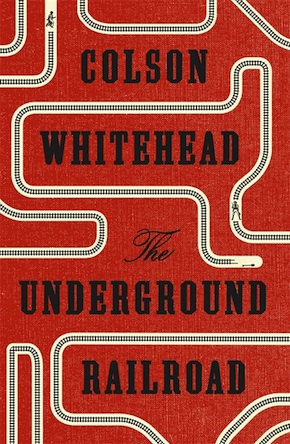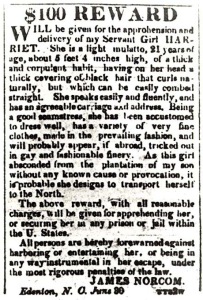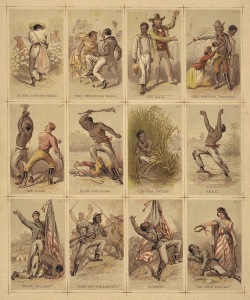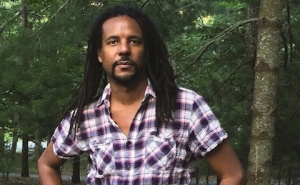Colson Whitehead: Making it
by Mark Reynolds
“A luminous, furious, wildly inventive tale.” Guardian
Colson Whitehead has just won the National Book Award for fiction for his bold and provocative novel The Underground Railroad, a nightmarish historical saga about a slave girl called Cora who’s on the run from the horrors of life on a Georgia plantation. Giving literal life to the metaphor for assisted escape, she emerges via a subterranean steam train to surreal visions of South and North Carolina, Tennessee and Indiana, where she encounters flawed possibilities of statehood in which slavery is encouraged, tolerated, fought against or abolished. Along the way she is shadowed by the sinister slave catcher Ridgeway, who is determined to deliver her back to her rightful owner. It’s an unsettling examination of the machinations of slavery and the shaky foundations of a nation, peppered with small triumphs of the human spirit. We met the day before the National Book Award announcement, a week after Donald Trump’s election victory dealt a crushing blow to liberal America’s self-esteem.
MR: The idea for the book had been germinating for a decade and a half. What was the initial spark, and what had to change before you could really get started?
CW: I came across a reference to the underground railroad and I remembered how when I was a kid in school and I first heard about it, I envisioned a literal subway. It seemed that would be a weird premise for a novel: what if it actually were for real? My first couple of books started from ‘what if?’ premises: what if an elevator inspector had to solve a criminal case? or what if we updated this Industrial Age figure John Henry for the Information Age? So I guess fifteen years ago, that was how I generated ideas: that’s a weird thing to think about; what if we start building a story out of it?
You’re very willing to mix up genres. You draw on historical accounts, but there’s also a steampunk element, there’s myth, allegory…
I think basically you pick the right tools for the job. So writing about my childhood in the 80s in Sag Harbor, that’s a realistic book, but obviously a post-Apocalyptic book like Zone One has a strong fantasy element. So I wasn’t trying to write a straight historical novel. I wanted to capture 1850 as my ballpark year for the book, but I was making things up, and I think once I start changing reality in South Carolina, it allows me to get into larger American truth but not sticking to the facts of history.
How much time did you spend reading or re-reading slave testimonies, and when did you know you had to just stop and move on to your fiction?
 It was three or four months. I immersed myself in mostly the slave narratives, and one or two overviews of the railroad history. As in most cases, something goes off and I’m really excited: I’ve amassed enough information and something just clicks and tells me I’m ready to go. Because most of it’s made up, I was just looking for the nouns and verbs and adjectives that would make it sound realistic. I also drew on books I’d read thirty years ago: Bad Blood, a history of the Tuskegee syphilis experiment that I read in college; the slave narratives that first introduced me to slavery, Frederick Douglass and Harriet Jacobs. Once I sat down to organise the book a lot of things I hadn’t been thinking about came to the forefront.
It was three or four months. I immersed myself in mostly the slave narratives, and one or two overviews of the railroad history. As in most cases, something goes off and I’m really excited: I’ve amassed enough information and something just clicks and tells me I’m ready to go. Because most of it’s made up, I was just looking for the nouns and verbs and adjectives that would make it sound realistic. I also drew on books I’d read thirty years ago: Bad Blood, a history of the Tuskegee syphilis experiment that I read in college; the slave narratives that first introduced me to slavery, Frederick Douglass and Harriet Jacobs. Once I sat down to organise the book a lot of things I hadn’t been thinking about came to the forefront.
Earlier books like Gulliver’s Travels and The Pilgrim’s Progress were also an influence. Was that based on a memory of having read them before? Did you go back to any of them before getting started?
Gulliver’s Travels I don’t remember reading as a kid, but there were a lot of cartoon versions that abridge it. And over the years when I was thinking about the story and trying to describe it to people, I’d say, you know, like Gulliver’s Travels, each state’s a different island – and people would roll their eyes, they didn’t know what I was talking about. So I went back to Gulliver’s Travels, to read it properly, and I was struck how alien it was. It was really about 18th-century British history and all this internecine political and religious in-fighting, but the structure is really sound. The Pilgrim’s Progress I did re-read. I had a class in senior year at high school on fabulism. We read Kafka, we read Edgar Allan Poe, The Pilgrim’s Progress, A Hundred Years of Solitude. I’d read a lot of fantasy in terms of science fiction and horror, but having a teacher say these are books with a fantastic element, and they’re considered literature, stuck with me, and so I went back and re-read those, and definitely García Márquez was very instructive.
I imagined what it would be like losing your children, being sold, being beaten… imagining your own family going through that is very powerful.”
Are any of the characters based on historical figures, or is each an amalgam?
An amalgam. Harriet Jacobs spent seven years in an attic, and I drew upon that for the North Carolina section, but Cora and Harriet Jacobs have very different personalities. I think she’s the one who has the most historical shading. Once we get to Valentine Farm, the progressive and more conservative black thinkers Mingo and Lander are taken from Booker T. Washington, W.E.B. Du Bois and Frederick Douglass. I just compressed and drew their arguments from different sources.
Were there any stories from your own family or the families of people close to you that you were also able to draw on?
No, all my grandparents had passed away when I was very young. There’s one strand of my family that goes back to free black tavern owners in Virginia, and the other three grandparents I have no idea. I imagined what it would be like to have that loss, losing your children, being sold, being beaten, and then as you do research, imagining your own family going through that is very powerful, but it is just imagining.
How much of a game-changer was it when Oprah picked the novel for her book club?
Well, you know, some of my books if you just read the jacket copy they sound kind of weird and you might just keep walking, but Oprah meant that people would stop and take a chance on the book. So it meant a lot of sales went out the gate and word-of-mouth kicked in and launched it quite quickly and quite happily for me.
And the star endorsements didn’t stop there, as President Obama then included it in his holiday reading.
I was thinking then, back in the summer, that we’ll miss having a president like Obama. Now after the election we just had we’ll definitely miss him. He interviewed Marilynne Robinson for The New York Review of Books, he’s a real advocate of fiction and non-fiction. It was a nice list, it had my book and H is for Hawk, which I hadn’t read and I picked up after that, so I like other people use his reading list for suggestions. But I was really glad, he’s been a really special and unique force. It made me psyched – and my mom was psyched.
 c. 1863. Library of Congress/Wikimedia Commons” width=”250″ height=”300″>What will Obama’s legacy be as president, and what might he have been able to do differently?
c. 1863. Library of Congress/Wikimedia Commons” width=”250″ height=”300″>What will Obama’s legacy be as president, and what might he have been able to do differently?
Do differently? I’m not sure, there’s real gridlock on the part of the Republicans. He could’ve been more aggressive, but he was outnumbered. I’m not sure what his legacy will be. For me, a lot of people didn’t turn out to vote, a lot of people took it for granted that we’d made so much progress, and so I think for the result of the election the legacy is don’t get complacent, and make sure you vote next time.
What are you expectations of America under a Trump administration?
Well they’re very low. He’ll probably be impeached. I think being president is very stressful and I don’t think he’s built for that. And in the meantime the Republican Senate and the Republican House will run amok and institute a lot of harsh conservative reform, so it’s going to be a very different and trying couple of years.
His first appointments are alarming as well. Steve Bannon as chief strategist?
He’s so right wing, the Daily Mail would look liberal. Breitbart News wasn’t really big until a couple of years ago, and then he became Trump’s adviser. He doesn’t do interviews, he stays behind the scenes, pulling levers. And I guess his idea is to have a global right-wing cabal, so he’s reached out to Le Pen and Putin, and it’s his dream to have these authoritarian monsters ruling the world. So it’s going to be scary for everybody, not just America.
Unfortunately if people have an opportunity they act upon it. That’s definitely the lesson of some of the cruelty in this book.”
Some commentators have suggested Michelle Obama should run in 2020, though she denies any ambition.
I’m sure the Obamas are pretty sick of Americans. No, it’s not going to happen.
So what is it going to take to get another black president or a woman in that office?
Well, a year before Obama got elected, there’s no way we could foresee him doing as well as he did. Even until he got the nomination it was sort of inconceivable. So right now there could be a female or an African American or a Latino future candidate being broken in and getting it together. Obama came out of nowhere, so who knows who’s going to be there four years from now, eight years from now? When Hillary and Obama were running against each other, I thought it was interesting, like what’s more powerful, sexism or racism? And it could be that sexism is actually more powerful. But who knows?
You have Lander say America is a ‘delusion’ built on ‘murder, theft and cruelty’. I guess the same could be said about any country or empire through history.
Any imperialist country, yeah.
So what does that tell us about human nature and nation-building?
Well I think for a lot of people, when they get power they want to capitalise on it, and that means expanding, and usually expanding means taking from other people, controlling them. It’s a real darkness to the human spirit, and unfortunately if people have an opportunity they act upon it. That’s definitely the lesson of some of the cruelty in this book.
Your UK tour has taken in Liverpool and Bristol. What kind of awareness did you encounter of the cities’ history as a slave-trading port?
I went and did readings, I didn’t really have time to soak up the culture. But I did go to the International Slave Museum and got a tour, and the director was acquainting me with the city of Liverpool and the controversy now about the fact a lot of the big buildings and streets are named after people who got rich off the slave trade. It’s ridiculous to say it’s a slow process, but being able to face up to our countries’ pasts and reckon with the legacy of history is difficult. We have the same thing in America, where there’ll be a college named after some big force in the Indian genocides, and there’s a statue in front of the dorm. Do we change the name of the dorm, what do we do? That goes on everywhere as people get more mindful of the real legacy of how nations are built, and how do we address the fact of these shared atrocities that made America great, made Britain great.
I see the TV rights have been picked up by the makers of Moonlight.
They had some really smart ideas about the book. If they get a deal with a TV company they want to make a mini-series of eight episodes and maybe we’ll go forward. They haven’t paid anything yet, but they have permission to take it out to get money.
So how do you think they’ll deal with the railroad? As a figment of Cora’s imagination?
They said actually they want to have more of the railroad in there. The meat of the book for me is the different states, and the railroad as it plays out in my head acts more as a portal. But they have ideas about spending more time there, so we’ll see.
What are you writing next?
Well you know this time last year I was still writing it, I didn’t finish until last December. I showed my editor and my agent the first hundred pages two summers ago, and they asked, can you hand it in for fall 2016? And I was like, I’ll try, I don’t know. I hadn’t written fiction in four years, but I think I was just ready to go, and I hit upon the narrative voice really quickly. I was faster and I was in a zone. Early this year we did the copyediting, the Oprah thing happened in April then it came out in the US in August, so I’ve really been on this treadmill. But in two weeks I’m done touring and then I’m just going to sit back and stream some Netflix for couple of months and then get back to work in the spring and see what I feel like working on.
 Colson Whitehead is the New York Times bestselling author of The Noble Hustle, Zone One, Sag Harbor, The Intuitionist, John Henry Days, Apex Hides the Hurt, and the essay collection The Colossus of New York. He is a Pulitzer Prize finalist*, a recipient of MacArthur and Guggenheim fellowships, and now a National Book Award winner. He lives in New York City. The Underground Railroad is published in the UK by Fleet.
Colson Whitehead is the New York Times bestselling author of The Noble Hustle, Zone One, Sag Harbor, The Intuitionist, John Henry Days, Apex Hides the Hurt, and the essay collection The Colossus of New York. He is a Pulitzer Prize finalist*, a recipient of MacArthur and Guggenheim fellowships, and now a National Book Award winner. He lives in New York City. The Underground Railroad is published in the UK by Fleet.
Read more.
colsonwhitehead.com
@colsonwhitehead
Author portrait © Madeline Whitehead
Mark Reynolds is a freelance editor and writer, and a founding editor of Bookanista
* On 10 April 2017, the Pulitzer jury named Colson Whitehead’s The Underground Railroad this year’s winner in the fiction category.

